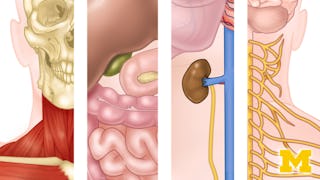- Browse
- Identifying Species
Results for "identifying+species"
 Status: Free TrialFree TrialU
Status: Free TrialFree TrialUUniversity of Florida
Skills you'll gain: Land Management, Climate Change Mitigation, Sustainable Development, Sustainable Systems, Environment and Resource Management, Water Resources, Sustainability Standards, Climate Change Adaptation, Water Resource Management, Environment, Natural Resource Management, Plant Operations and Management, Systems Thinking, Environmental Science, General Science and Research, Spatial Analysis, Socioeconomics, Research, Research Methodologies, Biology
4.8·Rating, 4.8 out of 5 stars112 reviewsIntermediate · Specialization · 3 - 6 Months
 Status: Free TrialFree TrialU
Status: Free TrialFree TrialUUniversity of Michigan
Skills you'll gain: Human Musculoskeletal System, Anatomy, Endocrinology, Pulmonology, Cardiology, Respiration, Hematology, Obstetrics And Gynecology, Orthopedics, Neurology, Nephrology, Kinesiology, Physiology, Urology, Medical Imaging, Sports Medicine, Biology, Medical Terminology, Cell Biology
4.8·Rating, 4.8 out of 5 stars4K reviewsBeginner · Specialization · 3 - 6 Months
- Status: NewNewStatus: Free TrialFree Trial
Multiple educators
Beginner · Specialization
 Status: PreviewPreviewU
Status: PreviewPreviewUUniversity of Cambridge
Skills you'll gain: Criminal Investigation and Forensics, Investigation, Laboratory Testing, Statistical Analysis, Molecular Biology, Specimen Collection, Scientific Methods, Medical Science and Research, General Science and Research, Data Collection, Case Studies, Biology, Ethical Standards And Conduct
4.8·Rating, 4.8 out of 5 stars9 reviewsBeginner · Course · 1 - 3 Months
 Status: Free TrialFree TrialU
Status: Free TrialFree TrialUUniversity of Colorado System
Skills you'll gain: Splinting, Patient Evaluation, Trauma Care, Medical Emergency, Sanitation, Emergency Medicine, Neurology, First Aid, Patient Positioning, Patient Transport, Wound Care, Emergency Medical Services, Patient Treatment, Safety Assurance, Clinical Assessment, Environment Health And Safety, Triage, Acute Care, Emergency Response, Vital Signs
4.8·Rating, 4.8 out of 5 stars114 reviewsBeginner · Specialization · 3 - 6 Months
 Status: NewNewStatus: Free TrialFree TrialS
Status: NewNewStatus: Free TrialFree TrialSSkillshare
Skills you'll gain: Photo Editing, Photography, Adobe Photoshop, Image Quality, Photo/Video Production and Technology, Storytelling, Content Creation, Adobe Creative Cloud, Creativity, Editing, Color Theory
2.8·Rating, 2.8 out of 5 stars6 reviewsBeginner · Specialization · 1 - 3 Months
What brings you to Coursera today?
 Status: PreviewPreviewA
Status: PreviewPreviewAAmerican Museum of Natural History
Skills you'll gain: Life Sciences, Biology, Environmental Science, Environment, Biochemistry, Physiology, Hydrology, Environmental Issue, Anatomy, Water Quality, Behavioral Health, Research
4.8·Rating, 4.8 out of 5 stars595 reviewsBeginner · Course · 1 - 3 Months
 Y
YYale University
Skills you'll gain: Anatomy, Neurology, Human Musculoskeletal System, Respiration, Physiology, Radiology, Surgery
4.8·Rating, 4.8 out of 5 stars46 reviewsBeginner · Course · 1 - 3 Months
 Status: PreviewPreviewA
Status: PreviewPreviewAAmerican Museum of Natural History
Skills you'll gain: Environment, Systems Thinking, Environmental Science, Natural Resource Management, Environmental Resource Management, Biology, Sustainable Development, Environmental Engineering and Restoration, Case Studies, Mathematical Modeling
4.8·Rating, 4.8 out of 5 stars3.4K reviewsIntermediate · Course · 1 - 3 Months
 Status: Free TrialFree TrialR
Status: Free TrialFree TrialRRice University
Skills you'll gain: Biology, Environment, Microbiology, Environmental Science, Life Sciences, Environmental Issue, Sustainable Development, Natural Resource Management, Physiology, Molecular Biology, Taxonomy, Cell Biology, Anatomy, Climate Change Adaptation, Estimation, Scientific Methods, Climate Change Mitigation, Experimentation
4.8·Rating, 4.8 out of 5 stars279 reviewsBeginner · Specialization · 3 - 6 Months
 Status: Free TrialFree TrialU
Status: Free TrialFree TrialUUniversity of Colorado Boulder
Skills you'll gain: Social Studies, Social Sciences, Sociology, Anthropology, Culture, Laboratory Research, Behavioral Health, Healthcare Ethics, Research, Media and Communications, Empathy & Emotional Intelligence, Ethical Standards And Conduct, Health Care, Cultural Diversity, Mental and Behavioral Health, Food and Beverage, Rehabilitation, Biology, Nutrition and Diet, Sports Medicine
4.7·Rating, 4.7 out of 5 stars210 reviewsBeginner · Specialization · 1 - 3 Months
 Status: Free TrialFree TrialU
Status: Free TrialFree TrialUUniversity of Illinois Urbana-Champaign
Skills you'll gain: Stakeholder Engagement, Environmental Monitoring, Hydrology, Community Outreach, Water Resource Management, Environmental Engineering and Restoration, Water Resources, Cultural Diversity, Land Management, Policy Analysis, Social Sciences, Cultural Sensitivity, Environment and Resource Management, Environmental Laws, Environmental Resource Management, Environmental Engineering, Natural Resource Management, Case Studies, Water Quality, Climate Change Adaptation
4.9·Rating, 4.9 out of 5 stars17 reviewsIntermediate · Specialization · 3 - 6 Months
What brings you to Coursera today?
In summary, here are 10 of our most popular identifying+species courses
- Agroforestry: University of Florida
- Anatomy: University of Michigan
- Building Trustworthy AI:
- Forensic Science: DNA Analysis: University of Cambridge
- Wilderness First Aid: University of Colorado System
- Portrait Photography: Skillshare
- Marine Biology: American Museum of Natural History
- Anatomy of the Head and Spine : Yale University
- Ecology: Ecosystem Dynamics and Conservation: American Museum of Natural History
- Introduction to Biology: Ecology, Evolution, & Biodiversity: Rice University










